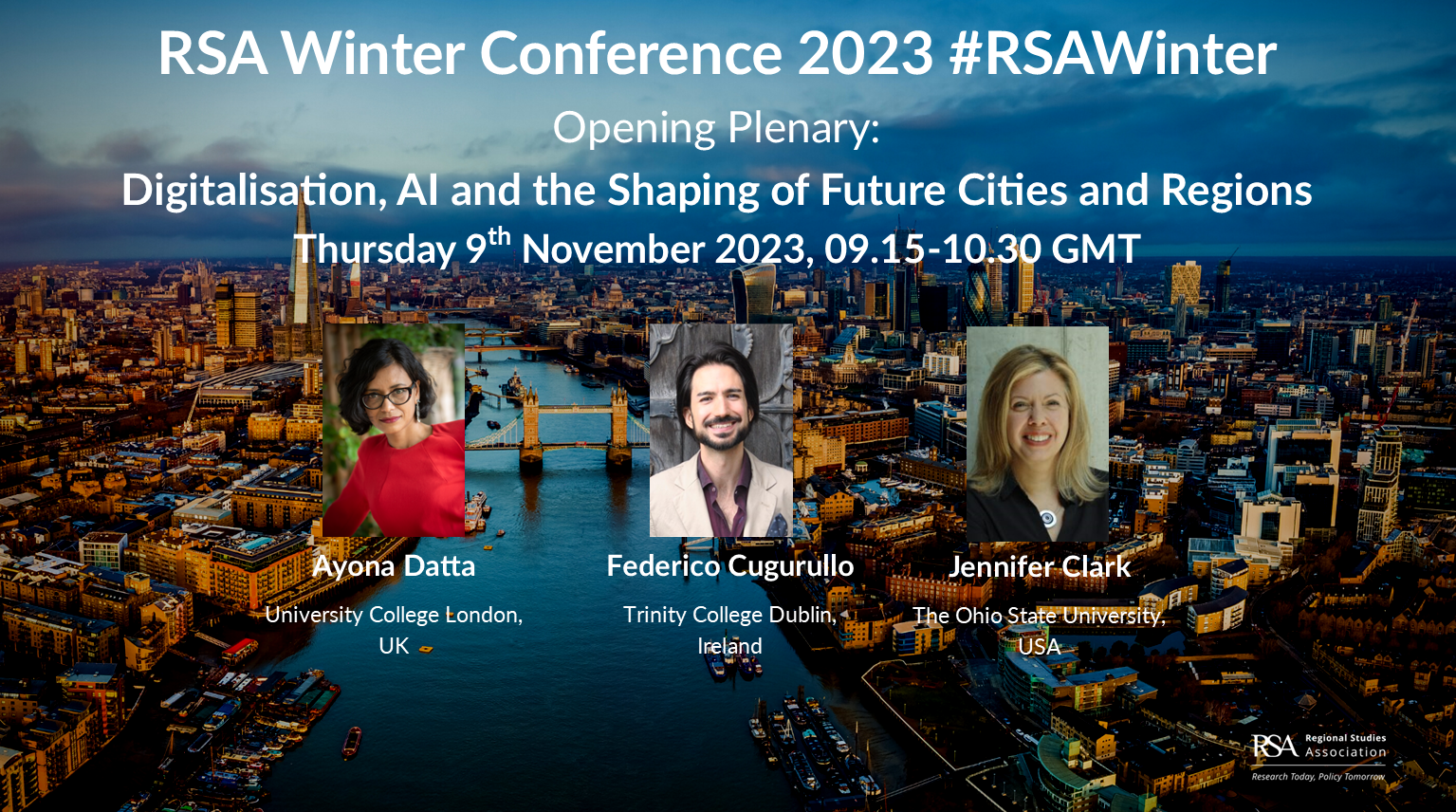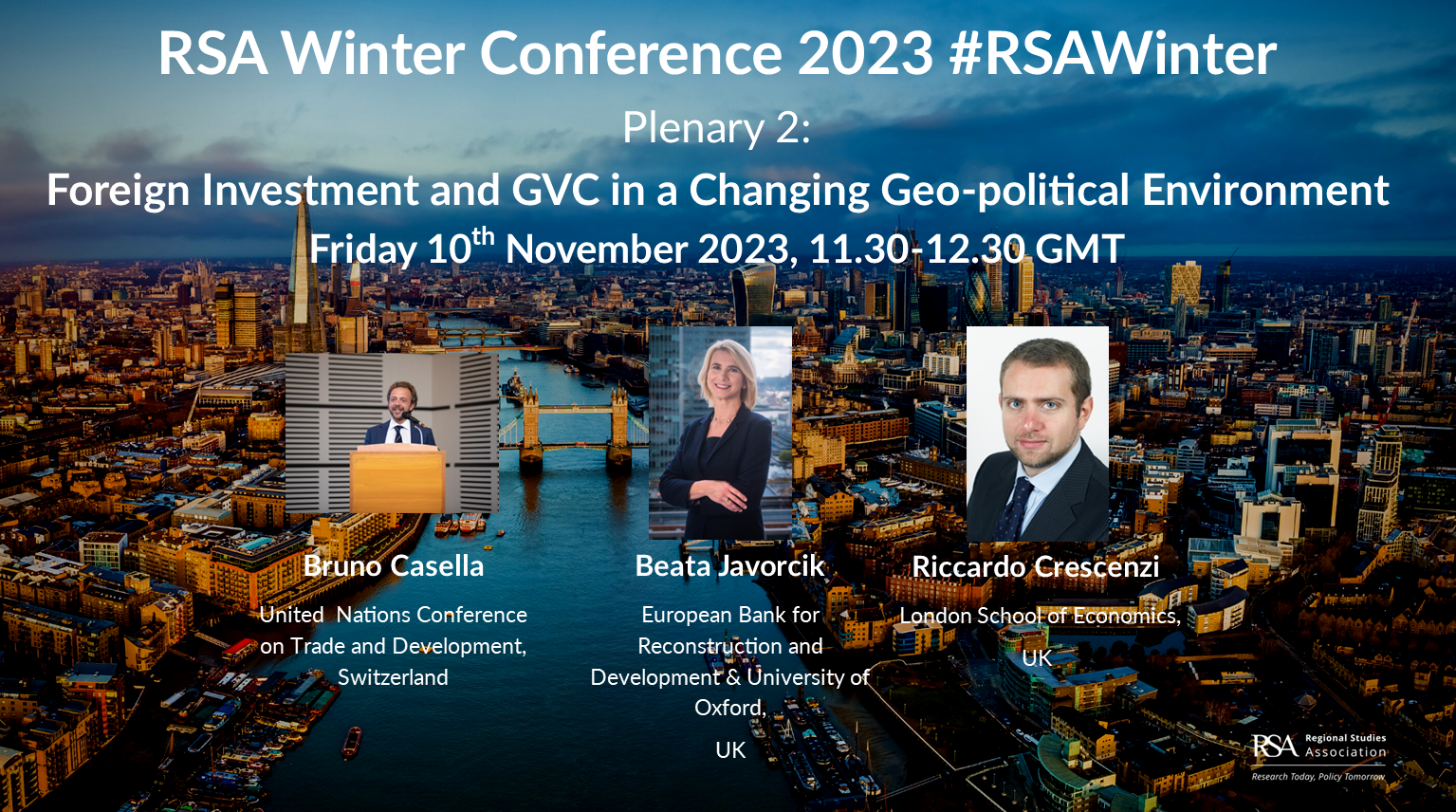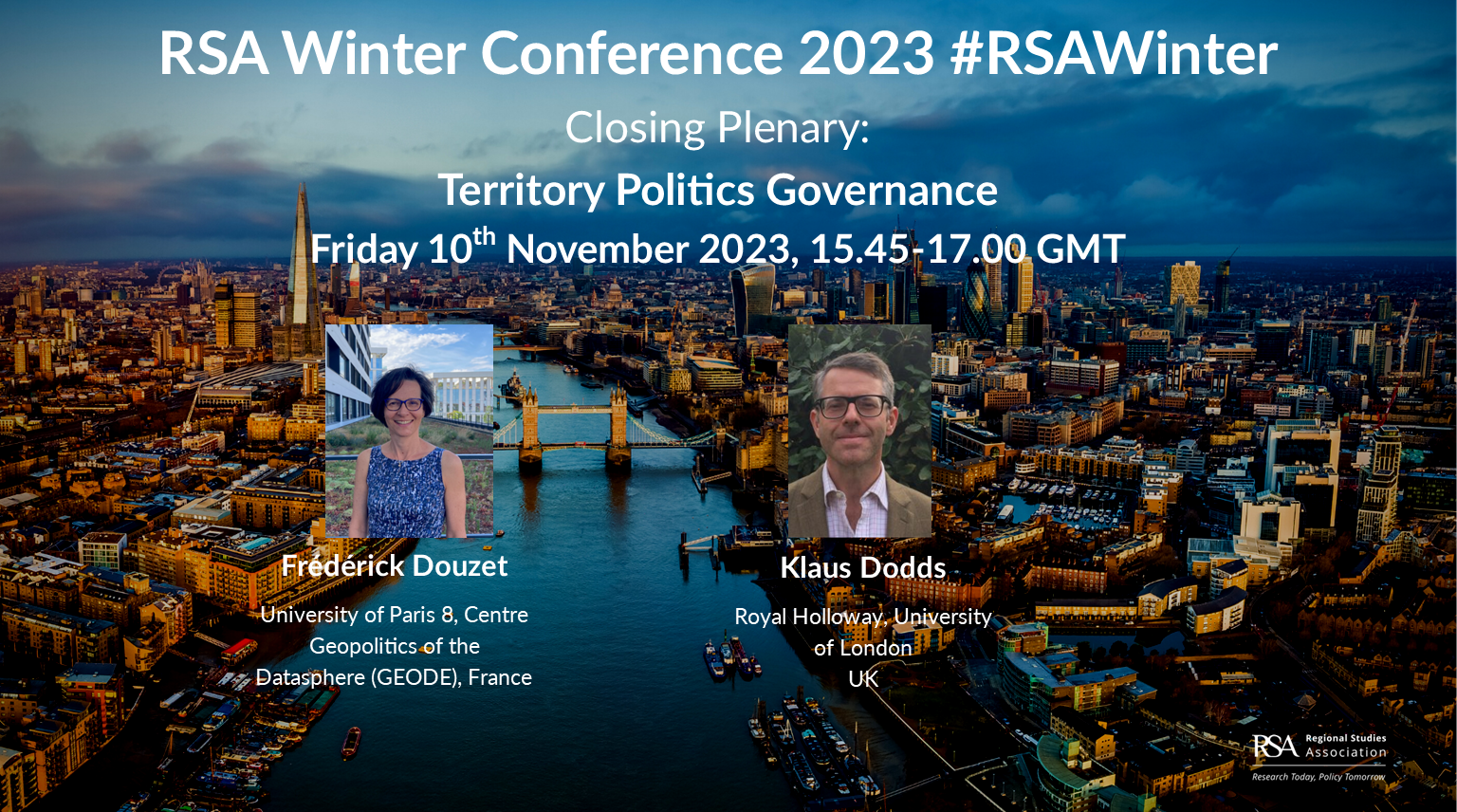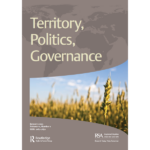2023 RSA Winter Conference Plenary Sessions and Speakers
For all information on the Plenary Sessions and Speakers for the RSA 2023 Winter Conference, please see below. To return to the main conference website click here.
Thursday 9th November 2023, 09.15 – 10.30 GMT
Opening Plenary: Digitalisation, AI and the Shaping of Future Cities and Regions

Technology, digitalisation and the rise of artificial intelligences are not universal. They vary across different geographical spaces and scales. They are inconsistent and incomplete across different stakeholders. This means some people and places are more or less exposed, dependent and impacted. The rise of more autonomous cities and regions therefore presents different opportunities and threats to people and places across the globe. The aim of this opening plenary session is to explore these uneven urban and regional geographies, to critically examine the interaction between digitalisation and artificial intelligence with cities and regions, and to explore the challenges this presents for the regional studies community.

Ayona Datta is Professor in Human Geography in University College London. She works on the intersections of postcolonial urbanism, digital citizenship and the politics of urbanisation, focusing on new configurations of gender-power relations in the digital-territorial margins. Her current research on ‘Regional Futures’ seeks to advance theoretical and empirical insights into the relationship between digitalisation and urbanisation in the global south. For her contributions to understanding of smart cities through fieldwork, she received the Busk Medal from Royal Geographical Society (with IBG) in 2019. In 2023, she was named the President of the Geography Section by the British Science Association.

Federico Cugurullo is Assistant Professor in Smart and Sustainable Urbanism at Trinity College Dublin. His research is positioned at the intersection of urban geography, political philosophy and experimental urbanism, and explores how artificial intelligence (AI) is influencing urban governance and planning, thereby impacting the sustainability of cities.
Theoretically, Federico is interested in unpacking the notion of AI from an urbanistic perspective, and in fleshing out the conceptual implications of AI-mediated urban spaces, such as the “end of the city” hypothesis introduced in his monograph. Empirically, he has done extensive research in the Middle East and Southeast Asia on many experimental cities including Masdar City, Hong Kong and The Line.
Federico is the author of Frankenstein Urbanism (Routledge 2021) and a co-editor of Inside Smart Cities (Routledge 2019).

Jennifer Clark is Knowlton School Distinguished Professor and Head of the City and Regional Planning Section in the College of Engineering at The Ohio State University. She is also a Visiting Professor of City and Regional Planning with the School of Business at the University of Stavanger in Norway. She has authored numerous articles, chapters, and books, including Uneven Innovation: The Work of Smart Cities (Columbia University Press, 2020) which won the 2021 Urban Affairs Association Best Book Award as well as the 2022 Regional Studies Association Best Book Award.
Friday 10th November 2023, 11.30-12.30 GMT
Plenary 2 – Foreign Direct Investment and Global Value Chains in a Changing Geo-political Environment

Growing geo-political tensions and increased systemic risk are calling into question the process of global economic integration in its pre-pandemic form. The resulting reconfiguration of foreign direct investment (FDI) networks and global value chains (GVCs) presents opportunities and challenges for economies across the globe. This plenary session aims to discuss new evidence on the diverse participation of regional economies in FDI networks and GVCs and on the varied impacts of changing patterns of global connectivity. The session will also seek to address some pressing policy questions, discussing how national and local policymakers can navigate this new reality to the enhancement of their local communities. Particularly of interest is how policies for the attraction and retention of FDI, as well as participation in GVCs and ‘upgrading’ into higher value-added parts of a value chain, can contribute to sustainable economic development in changing global economic environment.

Bruno Casella is senior economist at UNCTAD Division of Investment and Enterprise (DIAE) where he leads the Intellectual Property and Development Unit.
In 10 years as economist at UNCTAD, Bruno has been leading economic and policy research in various themes at the very core of the multilateral trade and investment agenda, including: investment and international taxation, global value chains and development, investment and industry 4.0.
An internationally renowned expert in foreign direct investment and international production, Bruno has published extensively in academic journals and in specialized reports and books, mainstreaming new analytical approaches and policy recommendations in the areas of international business and economics.
Prior to joining UNCTAD, he was manager at strategic consulting firm McKinsey & Company, where he provided strategic advisory to C-level clients across multiple geographies and industries, in the private and the public sector.
Bruno holds a PhD in Statistics and a degree in Economics at Bocconi University.

Beata Javorcik is Chief Economist of the European Bank for Reconstruction and Development (EBRD) in London. She is on leave from the University of Oxford, where she is the first woman to hold a Statutory Professorship in Economics. She is also a Fellow of All Souls College, Oxford and the Director of the International Trade Programme at the CEPR in London. She is a member of the Scientific Advisory Committee at ifo Institute, University of Munich, as well as of the Executive and Supervisory Committee of CERGE-EI in Prague. Before taking up her position at Oxford, she worked at the World Bank in Washington DC, where she focused on research, lending operations and policy advice. She holds a Ph.D. in Economics from Yale and a B.A. in Economics (Summa cum Laude) from the University of Rochester.

Riccardo Crescenzi is a Professor of Economic Geography at the London School of Economics. He has been a European Research Council (ERC) grant holder, leading a major five-year research project on foreign direct investment (FDI), global value chains (GVCs) and their territorial impacts across the globe. He is currently the LSE Principal Investigator of a large collaborative research project funded by Horizon Europe and UK Research and Innovation (UKRI) on inequalities in the era of global megatrends.
He is also an Editor of Regional Studies.
Riccardo has a long track-record of teaching and research in regional economic development, innovation, FDI and GVCs, and in the analysis and evaluation of public policies. This research is published in top peer-reviewed journals in economic geography, international economics and international business and management and widely cited in academic and policy circles. His most recent book “Harnessing Global Value Chains for Regional Development” (2023, Routledge) explores how regions, cities and clusters can build, embed and reshape global value chains for local enhancement
Friday 10th November 2023, 15.45-17.00 GMT
Closing Plenary Territory Politics Governance Session: The Geopolitics of Internet Data Routes


On May 30th, at 2.43 in the afternoon, the Internet went down in the city of Kherson for nearly an hour, when at gunpoint, Russian troops were forcing local operators to disconnect from Ukraine’s network and reconnect through Moscow. Why? Because for Russia, controlling the routes of the Internet to control information has become a strategic priority.
But not just for Russia. China, Iran, Pakistan and many more countries seek to control Internet routes for strategic purpose. And big private actors too, driven by performance and market forces. These strategies shape cyberspace and potentially bear major security and stability consequences. But they are difficult to assess because we lack adequate means to represent and analyze the geography of Internet routes and its strategic implications.
This conference offers new methodologies to develop a cartography of Internet routes and study how and with what consequences they can be leveraged for geopolitical control.
Through case studies on Ukraine, Iran and the Middle-East, it will show that the architecture of connectivity evolves according to foreign policy objectives, often through a complex process of co-construction, involving multiple stakeholders.
As a result, the Internet is at risk of fragmenting along national borders, and contracting around a few major routing operators and platforms.
These trends question the model of resilience of the Internet and raise human rights issues. In the long run, they could imperil the stability of our societies that heavily rely on digital connectivity.
Territory, Politics, Governance is an interdisciplinary journal from the Regional Studies Association. It is committed to the development of theory and research in territorial politics and the governance of space. The journal creates a platform on which to explore the interface between territory, politics, economy, identity and the organisation of political space. It confronts topical and emergent issues of world economic and political concern. The journal publishes original, high quality international scholarship from this growing, international and increasingly vibrant field directed at a worldwide academic audience and at policy makers, activists and other communities of practice.
The journal is indexed in Clarivate Analytics’ Social Sciences Citation Index and Scopus and has a significant circulation footprint as it is distributed with its sister journals, Regional Studies, Spatial Economic Analysis and Area Development and Policy. It is essential reading for academics and practitioners alike. For more details on the journal, go to www.tandfonline.com/journals/rtep20.

Frédérick Douzet is Professor of Geopolitics at the University of Paris 8, director of the French Institute of Geopolitics research team (IFG Lab) and director of the Center Geopolitics of the Datasphere (GEODE). She has been appointed senior member of the Institut Universitaire de France in 2022 and has been a member of the French Defense Ethics Committee from its creation in January 2020 until January 2023. In 2023, she received the title of “Chevalier de la Légion d’Honneur”.
In 2017, she was part of the drafting committee for the French Strategic Review of Defense and National Security. From 2013 to 2018, she was the director of the Castex Chair of Cyberstrategy at the Institute of Higher National Defense Studies. From 2017 to 2020, she was a Commissioner of the Global Commission on the Stability of Cyberspace. In 2021, she was a member of the Commission “Enlightenment in the Digital Age” appointed by President Emmanuel Macron.
Frédérick Douzet has received several awards for her research: ERC Advanced Grant (2022); International Forum on Cybersecurity (FIC) Book Prize (2015); France-Berkeley Fund Award for Outstanding Young Scholar (2014); Alphonse Milne Edwards book prize from the Society of Geography (2008); Ernest Lemonon book prize from the Academy of Moral and Political Sciences (2008); Best paper award from the Urban Affairs Association (2009). She has also received scholarships from the Fulbright Program and the Georges Lurcy Foundation.

Professor Klaus Dodds is Executive Dean for the School of Life Sciences and Environment at Royal Holloway and Co-Director of the Living Sustainably research catalyst (with Professor Redell Olsen). He is a Visiting Professor at the College of Europe, Warsaw Poland.
He researches in the areas of geopolitics and security, ice studies and the international governance of the Antarctic and the Arctic.